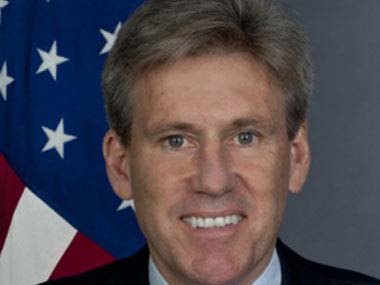Murdered US ambassador to Libya, Chris Stevens, sent a number of cables to the US, detailing an increasingly volatile situation in Libya, and providing information that hints that the US embassy attack may not have been caused by the anti-Islam film. Just two days before the 9/11 anniversary attack on the US consulate in Benghazi, Stevens sent a dispatch to Washington, saying that two leaders of the Libyan militias responsible for keeping order in the city had threatened to withdraw their men, saying they would not be able to continue providing security. The cable was sent on the day he died in the attack, the worst assault on a US diplomatic mission since the 1979 hostage crisis in Iran. The dispatch, which was marked “sensitive” but not “classified,” contained a number of other updates on the chaotic situation on the ground in post-Gaddafi Libya,
The Daily Beast reports.
[caption id=“attachment_484464” align=“alignleft” width=“380”]
 Chris Stevens.[/caption] The cable, reviewed by The Daily Beast, recounts how the two militia leaders, Wissam bin Ahmed and Muhammad al-Gharabi, accused the United States of supporting Mahmoud Jibril, the head of the Libyan transitional government, to be the country’s first elected prime minister. The cable also made no mention of a US-made YouTube video mocking the Prophet Muhammad which was originally thought to have been the motivation for the deadly assault on the consulate later that night,
the Daily Mail reported.
This could potentially mean that the attack on the US embassy was actually prompted by the unhappiness of the two militia leaders. Also, Chris Stevens is said to have disagreed with a State Department decision to pull out a 16-man team of special operations soldiers from Libya,
according to this Telegraph report.
Stevens had said that that if if were up to him, the Embassy “would not continue to guarantee security in Benghazi, a critical function they asserted they were currently providing.” Despite that warning, Stevens did not ask for more US troops, and said that Benghazi officials believed the city was becoming safer.
Chris Stevens.[/caption] The cable, reviewed by The Daily Beast, recounts how the two militia leaders, Wissam bin Ahmed and Muhammad al-Gharabi, accused the United States of supporting Mahmoud Jibril, the head of the Libyan transitional government, to be the country’s first elected prime minister. The cable also made no mention of a US-made YouTube video mocking the Prophet Muhammad which was originally thought to have been the motivation for the deadly assault on the consulate later that night,
the Daily Mail reported.
This could potentially mean that the attack on the US embassy was actually prompted by the unhappiness of the two militia leaders. Also, Chris Stevens is said to have disagreed with a State Department decision to pull out a 16-man team of special operations soldiers from Libya,
according to this Telegraph report.
Stevens had said that that if if were up to him, the Embassy “would not continue to guarantee security in Benghazi, a critical function they asserted they were currently providing.” Despite that warning, Stevens did not ask for more US troops, and said that Benghazi officials believed the city was becoming safer.
Did anti-Islam film really kill US ambassador to Libya?
FP Staff
• October 9, 2012, 14:37:16 IST
A cable recounts how the two militia leaders, Wissam bin Ahmed and Muhammad al-Gharabi, accused the United States of supporting Mahmoud Jibril, the head of the Libyan transitional government, to be the country’s first elected prime minister.
Advertisement
)
End of Article